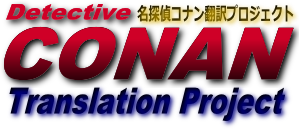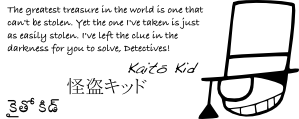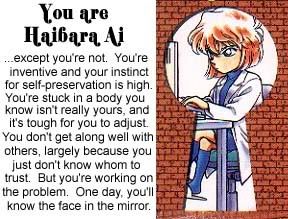Ask anything about Japanese language - 日本語ã
-
meidei
- ã
Posts: 185- Contact:
Ask anything about Japanese language - 日本語ã
Due to popular request... the Ask Anything about Japanese language thread has been launched.
If you have any questions about how Japanese language works or want a short translation of something, post here.
If you have any questions about how Japanese language works or want a short translation of something, post here.

-
Holmes
- Erabareshi Kodomotachi
Posts: 1291
Re: Ask anything about Japanese language - 日本語ã
Ok first question that I always wanted to know: when do they use eihter one of the 3 forms of writing?
-
Tanner-kun
Posts: 1492
Re: Ask anything about Japanese language - 日本語ã
I know one is used for non japanese words. Dont know which one though.Holmes wrote: Ok first question that I always wanted to know: when do they use eihter one of the 3 forms of writing?
-
Umandsf
- Something witty should go here.
Posts: 1179
Re: Ask anything about Japanese language - 日本語ã
Katakana is usually used for foreign words. Hiragana and kanji are used for the rest, although hiragana is used more often for ease of reading, a.k.a. to help those not so literate in kanji. At least, that's my understanding.
- King InuYasha
Posts: 18
Re: Ask anything about Japanese language - 日本語ã
Why does the Japanese language use Kanji? Why not consolidate to completely using either Hiragana or Katakana?
-
meidei
- ã
Posts: 185- Contact:
Re: Ask anything about Japanese language - 日本語ã
Kanji is basically names, nouns, adjectival nouns and to write the root of verbs, adverbs and pure adjectives. Kanji can have multiple pronunciations. There are about 2000 (a bit more actually) that anyone should know and the rest are meant to be replaced either by Kana or accompanied by Furigana*.Holmes wrote: Ok first question that I always wanted to know: when do they use eihter one of the 3 forms of writing?
Hiragana is used mainly for grammatical stuff like suffixes that change when a word is conjugated, particles (eg wa, ga, wo, to, ni, kara etc), any word that doesn't have an associated kanji or it would be an overkill to use it. Now, what is considered as overkill is not something I know. I've been told that I use too much kanji sometimes. But actually I can read only few of them.
Katakana is the emphatic version of Hiragana. When you write Japanese words in Katakana it means that you want to emphasize something unusual about them. For one, å
Last edited by meidei on April 5th, 2010, 10:14 pm, edited 1 time in total.

-
soratothamax
- Bang.....
Posts: 899- Contact:
Re: Ask anything about Japanese language - 日本語ã
Often times when -kun is used, in many mangas and anime, it's used by females, which I thought it meant because they were male, which showed respect, and it was mostly used by the younger crowd of females, like males use -chan toward women. But in XXXHolic it -kun was used by a dude....so does that mean he's teasing him? Shows some respect? Or what does it mean if a dude uses it?
-
Akonyl
- Community Hero
Posts: 4200
Re: Ask anything about Japanese language - 日本語ã
might be wrong, but I was always under the impression of -kun just being a friendly honorific, with -chan being a friendly honorific directed towards women (and sometimes men in a teasing fashion), though I could be wrong.soratothamax wrote: Often times when -kun is used, in many mangas and anime, it's used by females, which I thought it meant because they were male, which showed respect, and it was mostly used by the younger crowd of females, like males use -chan toward women. But in XXXHolic it -kun was used by a dude....so does that mean he's teasing him? Shows some respect? Or what does it mean if a dude uses it?
-
soratothamax
- Bang.....
Posts: 899- Contact:
Re: Ask anything about Japanese language - 日本語ã
so if a guy used -kun toward another guy....what does that mean?
I don't see men using -kun with each other often...
I don't see men using -kun with each other often...
-
Akonyl
- Community Hero
Posts: 4200
Re: Ask anything about Japanese language - 日本語ã
just that they're on friendly terms with one another, I would imagine (otherwise, I can't think of an honorific dudes could use other than -san, which is all formal and stuff)
but I'll let the tc actually answer the question.
but I'll let the tc actually answer the question.
-
meidei
- ã
Posts: 185- Contact:
Re: Ask anything about Japanese language - 日本語ã
No, boys and men use -kun to address younger males (or inferiors regardless gender in workplaces) more often than women do (judging from real life experience, not animé).soratothamax wrote: Often times when -kun is used, in many mangas and anime, it's used by females, which I thought it meant because they were male, which showed respect, and it was mostly used by the younger crowd of females, like males use -chan toward women. But in XXXHolic it -kun was used by a dude....so does that mean he's teasing him? Shows some respect? Or what does it mean if a dude uses it?
There are so many uses of -kun (and honorifics in general) that I think we can only explain them on an individual basis.
Wikipedia disagrees though, giving just 3 meanings to -kun.
Kun
Kun (å
Last edited by meidei on April 6th, 2010, 11:24 am, edited 1 time in total.

-
soratothamax
- Bang.....
Posts: 899- Contact:
Re: Ask anything about Japanese language - 日本語ã
No, boys and men use -kun to address younger males (or inferiors regardless gender in workplaces) more often than women do (judging from real life experience, not animé).meidei wrote:soratothamax wrote: Often times when -kun is used, in many mangas and anime, it's used by females, which I thought it meant because they were male, which showed respect, and it was mostly used by the younger crowd of females, like males use -chan toward women. But in XXXHolic it -kun was used by a dude....so does that mean he's teasing him? Shows some respect? Or what does it mean if a dude uses it?
There are so many uses of -kun (and honorifics in general) that I think we can only explain them on an individual basis.
Wikipedia disagrees though, giving just 3 meanings to -kun.
Kun
Kun (å
- King InuYasha
Posts: 18
Re: Ask anything about Japanese language - 日本語ã
Thanks for that explanation...meidei wrote:Many reasons. In not-so-random order:King InuYasha wrote: Why does the Japanese language use Kanji? Why not consolidate to completely using either Hiragana or Katakana?
a) Japanese are attached to their script. (We all are. English has historical spelling -really messed up-, French has also -to a ridiculous point of using 4 letters to spell the sound /o/, Greek also - thanks god it got a bit simplified with the abolishment of the useless non-spoken accent marks) .
b) Many homophones. Japanese doesn't have a large variety of sounds. With just 5 vowels and 14~15 consonants that must come in pairs of C-V or C-j-V (this is, open syllables) you don't have many possible combinations. Kanji helps a lot here.
c) If kanji were to be abolished, all written material would became unaccessible to the future generations.
d)Since Japanese is written without any spacing, the mixture of all three scripts help to tell where the word start and where it ends. Getting rid of Kanji would require introducing new punctuation rules. And judging from romanized Japanese I have read, they are not really agreeing on a standard.
etc.
Oh, and sorry for any spelling or grammar errors, it's really late in my timezone and I'm not really in a position to proofread.
So, if Japanese had 14 consonants and 5 vowels, then that means there is a max of 70 C-V combinations?
Compared to English, which has 21 consonants (including y) and 5 vowels, meaning a max of 105 C-V combinations...
Hmm... It seems to make sense, but I dunno.
The spacing thing makes sense. Though, I thought there were standards for Japanese Romanization?
And I've noticed in the karaoke of the eighth Detective Conan opening, I hear "wa" but "ha" is written on screen... Why?
-
meidei
- ã
Posts: 185- Contact:
Re: Ask anything about Japanese language - 日本語ã
79 direct syllables according to my calculations. C-j-V combinations are less common, but adding them in account we reach a total of 100 sounds plus the syllabic N. (Also note that two Japanese consonants, "y" and "w" can give only ya-yu-yo and wa respectively. And "wa" has only few more decades of use max. I can already hear it shifting to a plain "a".)King InuYasha wrote:Thanks for that explanation...meidei wrote:Many reasons. In not-so-random order:King InuYasha wrote: Why does the Japanese language use Kanji? Why not consolidate to completely using either Hiragana or Katakana?
a) Japanese are attached to their script. (We all are. English has historical spelling -really messed up-, French has also -to a ridiculous point of using 4 letters to spell the sound /o/, Greek also - thanks god it got a bit simplified with the abolishment of the useless non-spoken accent marks) .
b) Many homophones. Japanese doesn't have a large variety of sounds. With just 5 vowels and 14~15 consonants that must come in pairs of C-V or C-j-V (this is, open syllables) you don't have many possible combinations. Kanji helps a lot here.
c) If kanji were to be abolished, all written material would became unaccessible to the future generations.
d)Since Japanese is written without any spacing, the mixture of all three scripts help to tell where the word start and where it ends. Getting rid of Kanji would require introducing new punctuation rules. And judging from romanized Japanese I have read, they are not really agreeing on a standard.
etc.
Oh, and sorry for any spelling or grammar errors, it's really late in my timezone and I'm not really in a position to proofread.
So, if Japanese had 14 consonants and 5 vowels, then that means there is a max of 70 C-V combinations?
Compared to English, which has 21 consonants (including y) and 5 vowels, meaning a max of 105 C-V combinations...
Hmm... It seems to make sense, but I dunno.
The spacing thing makes sense. Though, I thought there were standards for Japanese Romanization?
And I've noticed in the karaoke of the eighth Detective Conan opening, I hear "wa" but "ha" is written on screen... Why?
English has more than 5 vowels, about 12 AFAIK, many diphthongs and allows constant clusters, unlike Japanese. There are far more possible sounds in English.
There are standards for romanization (3 big ones) but not really for spacing.
For example, some consider particles like (wa, ga, ni, kara etc) as part of the word that modifies, others would spell it with a space between. Some spell auxilary verbs as one word, some in more than one. Eg Kikimashitayo OR Kikimashita yo OR kiki mashitayo OR kiki mashita yo. And that's a simple example. And then there is also capitalization which also has no hard rules. A lot of changes for a conservative nation like Japan.
That's one of the 3 irregularities of the modern Kana (syllabaries) spelling.And I've noticed in the karaoke of the eighth Detective Conan opening, I hear "wa" but "ha" is written on screen... Why?
The particle WA is spelled with the kana "ha" cause very long ago the symbol for H represented W.
The Particle E is spelled with the kana "he". I don't really know the reason for this. Either "h" at some point of the Japanese history was mute or they were actually pronouncing it "he" in older times.
The particle O is spelled with the kana "wo". All W-sounds except "wa" are long gone and words that used to be spelled with wi, we or wo are now spelled as i, e, o. The particle usage is an exception.
See more about Historic Kana Usage here.
Last edited by meidei on April 6th, 2010, 2:50 pm, edited 1 time in total.

- Kleene Onigiri
- Community Rice Warrior
- *punches Akonyl*
Posts: 2479
Re: Ask anything about Japanese language - 日本語ã
Isn't Hattori saying "Kudo-kun"? Same with Genta and Mitsuhiko with "Conan-kun" D: Sometimes they all just say "Conan"/"Kudo" too (especially when they are worried or angry at him XD)soratothamax wrote: so if a guy used -kun toward another guy....what does that mean?
I don't see men using -kun with each other often...
I think Kazuha is saying "Kudo-kun" too, not sure about that tho.

Keyhole drawn by Yuri Iwamoto <3
Spoiler: Secret Santa gift from Commi-Ninja <3
༼ つ ◕_◕ ༽つ Giff holidays








